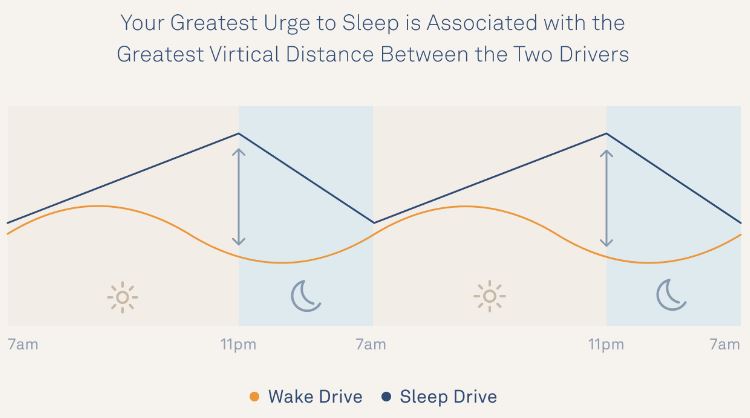We could all benefit from a boost in alertness, particularly when our sleep has been disrupted, or we’re feeling drowsy. But do you know what makes us feel sleepy in the afternoon, and how long you should nap to maximise the benefits, and minimise the downsides? I recently gave a presentation called ‘Endless Energy’ and noted that the 3pm slump is a real thing, not imagined. If you are keen to hear this presentation, get in touch I’d love to share it with your team and wider organisation.
Anyway, back to naps!
What Makes Us Feel Sleepy?
Whenever we are awake, a neurotransmitter called adenosine accumulates in our brain, as a by-product of brain cells firing. Adenosine molecules bind to receptors, slowing the brain cells down, making us feel sleepy. You can imagine this process as an hourglass that fills up during the day, increasing our drive to sleep, then flips over and empties overnight. In contrast, our body clock, which completes a cycle once every twenty-four hours, influences our drive to stay awake. Our sensations of sleepiness or alertness are the outcome of the interaction between our sleep drive and wake drive.

Our greatest urge to sleep occurs when our sleep drive approaches its maximum, and our wake drive is at its weakest. Ideally, this urge should coincide with the late evening. However, if we haven’t slept enough, we can begin the day without having completely ’emptied’ our ‘sleep timer.’ Consequently, by the time we hit the afternoon, the gradual drop in wake drive interacts with our higher-than-normal sleep drive and makes us crave a nap to recharge. Taking a nap is like flipping over the hourglass. As you sleep, the sand runs in the opposite direction, and sleep pressure reduces. Even if we don’t feel sleepy, this mechanism can still provide a boost in alertness.
The Benefits of Naps (& How Long They Last For)
The benefits of naps are relative to their duration.
- 10-minute naps can result in immediate improvements in cognitive performance and reduced sensations of fatigue, with the benefits lasting for over two hours.
- 20-minute naps can improve physical endurance by increasing time to exhaustion and reducing perceived exertion (but only if you slept less than seven hours the night before).
- 26-minute naps may improve task performance by 34% and alertness by 50%, for several hours after the nap.
- 30-minute naps, taken after lunch, are associated with improved cognitive flexibility.
Studies have also described how naps enhance memory consolidation, improve executive functioning, and increase emotional stability.
The Downside of Napping
Unfortunately, napping also has its downsides. Naps longer than 20-30 minutes increase ‘sleep inertia;’ the tired feeling after you wake up. Also, taking a nap later in the day can interfere with that night’s sleep, so try to nap by the early afternoon.
Using an Oura Ring?
Oura automatically detects naps with at least 15 minutes of sleep. You’ll get credit in the Oura App, and your Readiness and Sleep Scores will reflect this additional sleep.
In an ideal world, we would all get enough sleep to stay alert throughout the day, but an occasional nap is a healthy and efficient way to boost your well-being and performance.
These words were brought to you by the good people at Oura – if you are keen to get your own ring you can save $50 using my refer a friend link: https://ouraring.com/raf/f2622ff7de
If you’d rather try before you buy then I have a sleep study service which gives clients an insight into their own sleep habits and creates clarify around opportunities for imporving sleep qulaity and quantity. If this is of interest click here to read more and book in your sleep assessment.
